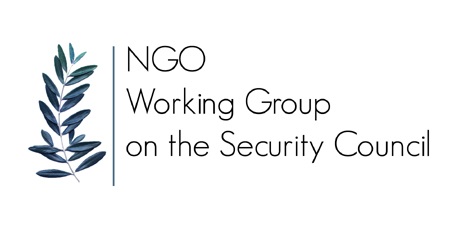Introduction
The NGO Working Group on the Security Council is a group of about thirty-five NGO representatives whose organizations have a special interest in Council matters. Founded in its present form in 1997, the group now organizes off-the-record briefings with ambassadors on the Security Council. The group also meets from time to time with top UN officials and occasionally also with ministers, parliamentarians and NGO experts. Group members include many large international NGOs in the fields of humanitarian relief, human rights, disarmament, global governance and development. The NGO side has high-level representation, including heads of agency, senior officers or respected NGO representatives. The meetings take place primarily with the Permanent Representative, either in missions or in NGO conference rooms.
NGOs' Interest in the Council
NGOs have a large stake in the work of the Council. The Council's decisions directly affect the core programs of many NGOs. NGOs need good information on the Council and its work, so as to better plan and carry out their policy. NGOs also have important information, expertise and experience that they want to offer the Council, to influence its thinking on policy matters. This is particularly true of human rights and humanitarian organizations that are directly in the field during complex emergencies. Further, both the UN and member states turn to NGOs as partners and service contractors, as well as policy-innovators, in emergency and post-emergency situations under the Council's authority.
Council Members' Interest in Dialogue with NGOs
Council members have found that NGOs can provide valuable field information from their contacts in crisis areas, helping to improve their delegations' awareness of the issues and contributing to the Council's policy-making process. In many cases, NGOs may even be directly involved in UN field programs. The Department of Political and Peacebuilding Affairs often draws on NGO sources when it prepares Council briefing papers, suggesting the potentially unique quality of this information.
Furthermore, NGOs can offer valuable analytical capacity, as the Council considers broad policy issues such as improving sanctions, strengthening peace-building, improving early warning capacity, and protecting humanitarian workers, among other topics. Delegations sometimes call on NGOs to help them with background papers or to suggest experts and reference sources as they consider these issues.
Additionally, NGOs are a vital link to and from the public, to engage policy-makers and influentials in many countries in ways that are more comprehensive than media coverage of the Council. All Council members find this aspect useful, as they seek to define and explain their position to a broad and global audience.
Finally, delegates find the Working Group meetings to be helpful and thought-provoking, an often refreshing change of pace from the Council's numbing round of meetings. The NGO meetings enable delegates to reach beyond the diplomatic community to engage with an extremely well-informed group, representing an impressive range of concerns.
A Brief History of the NGO Working Group
In early 1995 a group of NGOs came together in New York to organize the NGO Working Group on the Security Council. A number of delegations gave encouragement to this initiative and several public meetings took place. The Working Group became increasingly active in 1997, as the group began a regular series of meetings with Council ambassadors. In addition to the ten elected members, all five permanent members agreed to meet with the Working Group.
In 1998 the Working Group held 21 meetings with delegates on the Council, and in 1999 the Working Group held 32 similar meetings. By 2002, the tempo had increased to 36 meetings with delegates, 2 meetings with foreign ministers and 5 meetings with high UN officials, as well as a variety of other events, totaling 50 in all for the year.
The Working Group also organizes informal contacts between NGOs, delegates, experts and others. It occasionally organizes small private meetings or lunches. And it helps to circulate documentation and information about the Council to the NGO community and the wider public.
Membership and Practices of the Working Group
The Working Group has a closed membership. NGO representatives that wish to join must apply and prove the seriousness of their purpose and their organization's special program concern with the Security Council. The Working Group does not claim to be representative in any formal sense, but it does have powerful legitimacy, since it contains many of the largest and most effective international NGOs working at UN Headquarters in fields such as humanitarian relief, human rights, global governance, women's rights, and disarmament. Four WG member organizations have won the Nobel Peace Prize.
The NGO Working Group is headed by elected officers and governed by a Steering Group of seven members. Historically the Global Policy Forum acted as secretariat of the Working Group, and in 2013 the secretariat was transferred to the Institute for Global Policy. In 2020 the Global Centre for the Responsibility to Protect became the secretariat. The Working Group meets annually in a plenary meeting to discuss its process and working methods.
The briefings with delegations are always confidential and off-the-record to enable a frank and open dialogue. Typically, 18-25 NGO representatives attend. Sometimes PRs bring other members of their delegation to the meetings to address special topics. The briefing starts with an opening presentation, usually concerning two or three major issues currently before the Council, followed by a question and answer period. The entire briefing lasts for an hour or hour and a half.
